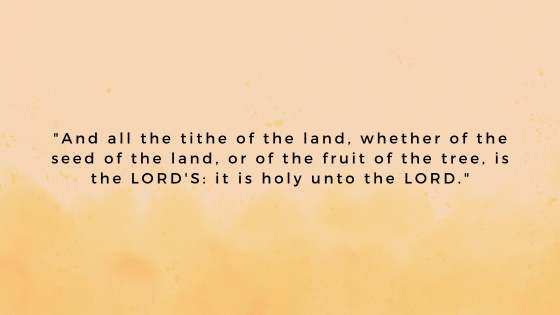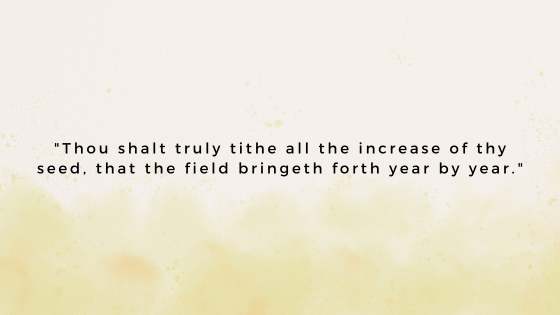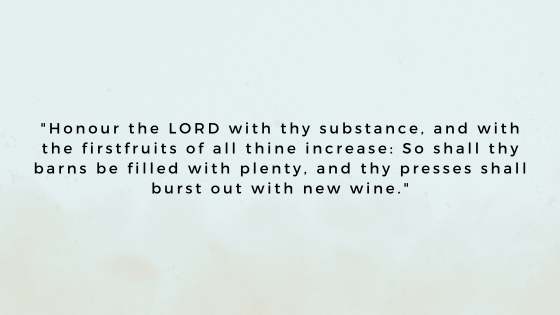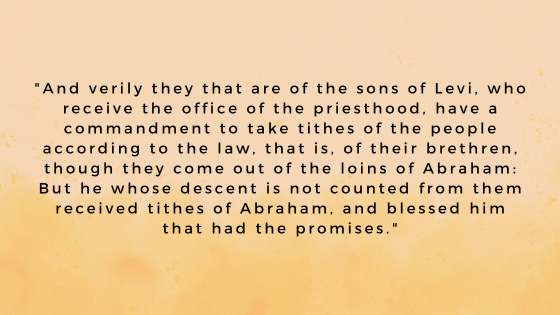Tithes and offerings Bible verses encourage believers to embrace a spirit of generosity. We’ll explore 11 powerful Old and New Testament verses that speak directly to this aspect of a Christian’s spiritual life. As you reflect on these verses, let them guide your giving decisions. Now, let’s see what the Bible says about the practices of giving tithes and offerings.
But first…

Table of Contents
- Key Takeaways
- The Difference Between Tithes and Offerings
- 5 Biblical Verses on Old Testament Tithes and Offerings
- 7 Biblical Verses on New Testament Tithes and Offerings
- 2. Luke 6:38
- 5 Ways to Incorporate Tithing and Offerings in Your Financial Planning
- 5 Common Challenges in Giving Tithes and Offerings
- A Final Word
Key Takeaways
The Difference Between Tithes and Offerings

Tithes and offerings serve different purposes. What’s the difference? And why does it matter tithes? We’ll start with tithes.
Quick Look at Tithes
The first mention of tithing appears in Genesis when Abram (later Abraham) gave a tenth of his spoils of war to Melchizedek, the priest of God Most High (Genesis 14:18-20). Abram’s tithe to the High Priest was a way of honoring the LORD for his victory. The tithe given during that time is what is often called pre-law tithing. In other words, it’s tithing before the LORD established the Law of Moses (Mosaic Law).
According to the Law of Moses, the LORD required tithes from ancient Israel. The Hebrew Israelites first received instruction tithe from the land in Leviticus 27:30. The purpose here was to help the children of Israel honor the LORD and trust Him for their provision. We see in later Scripture that the tithe served other purposes, such as:
- Support the Levites, priests, and temple workers (Numbers 18:21).
- Help care for the community, especially the poor, widows, orphans, and strangers (Deuteronomy 14:28-29).
- Express gratitude toward the LORD (Proverbs 3:9).
Now, here’s an important point: The tithe was never money. It was only consumable items, such as vegetables, fruits, olive oil, wine, livestock, etc. Check out this article if you want to dive deeper into the biblical tithe.
A Quick Look at Offerings
The first offering took place in the book of Genesis. Cain offered fruit to the LORD (Genesis 4:3). Like tithing, offering became a legal requirement under the Law of Moses (Exodus 18:12). This form of giving came in many forms. Key offerings included the following:
- Burnt Offering (Leviticus 1): Symbolized an atonement for sin.
- Grain Offering (Leviticus 2): An offering of thanks and dedication, often accompanying other sacrifices.
- Peace Offering (Leviticus 3): Expressed thanksgiving, fulfillment of vows, and voluntary devotion.
- Sin Offering (Leviticus 4): Made for unintentional sins, providing atonement and forgiveness.
- Guilt Offering (Leviticus 5): Addressed specific sins requiring restitution.
Freewill offerings were another form of giving. Unlike the offerings listed above, freewill offerings were voluntary gifts presented to the LORD. These offerings aimed to express gratitude, devotion, or reverence for the Most High.
A Modern-Day Perspective
Most Christian church preachers proclaim Christians must give a tenth of their income to God. However, an offering is any voluntary amount of money above the tithe. In other words, tithing is your baseline commitment, and offering is the extra you give out of love or gratitude.
5 Biblical Verses on Old Testament Tithes and Offerings

Let’s shed more light on tithing and offering from a biblical perspective. The verses below can deepen your knowledge of Scripture, strengthen your faith, and help nurture the spirit of generosity.
1. Malachi 3:10

This verse highlights the promise the LORD made to ancient Israel. It serves as a reminder to the Hebrew Israelites that the Most High would shower them with blessings if they continued to tithe. In ancient Israel, a storehouse, also known as a granary or treasury, was used to store agricultural produce, tithes, offerings, and other resources.
Key Takeaway: Blessings follow our obedience to his commandments.
2. Leviticus 27:30

Here, God is making it clear that a tenth of everything from the land, whether it’s crops or fruits, belongs to Him. Tithing was a way for ancient Israel to acknowledge that everything they have comes from Him.
Key Takeaway: The LORD is the source of all we have, and we should be thankful for his provisions.
3. Deuteronomy 14:22

This verse instructs the children of Israel to tithe each year from the increase of their agricultural produce. The LORD expected them to make tithing a regular practice.
Key Takeaway: The Most High provides for all needs, and believers are expected to express gratitude for the blessings He grants us.
4. Numbers 18:21

God explains that the Levites, the priests who took care of the temple, were to receive the tithes from the rest of Israel as their inheritance. This sacrificial system supported the Levitical priesthood for their dedicated service to God.
Key Takeaway: Every believer can play a role in advancing God’s kingdom (and this isn’t limited to giving money).
5. Proverbs 3:9-10

The proverb calls on the Hebrew Israelites to honor the Lord with their wealth and the firstfruits of their labor. The promise of overflowing barns and wine vats symbolizes God’s abundance from faithful giving.
Key Takeaway: Giving our best to God demonstrates our trust in His provision and invites His blessings into our lives.
These tithes and offerings Bible verses highlight the importance of expressing faith, obedience, and gratitude to God. They also promise blessings and provision in return for our faithfulness.
7 Biblical Verses on New Testament Tithes and Offerings

Here are five well-known verses of the New Testament that talk about tithes and offerings:
1. Matthew 23:23

Here, Jesus calls out the religious leaders for being too focused on tithing even the smallest herbs. They are rebuked for neglecting more important things like justice, mercy, and faith.
Key Takeaway: Avoid the trap of legalism, which emphasizes religious works more than the internal transformation that reflects God’s righteousness.
2. Luke 6:38

Luke 6:38 is part of Jesus’ Sermon on the Plain. In this sermon, Jesus instructs his disciples and the broader crowd to live according to God’s will. He emphasizes love, mercy, and non-judgment. Verse 38 builds on these teachings by emphasizing the principle of generosity.
Key Takeaway: Generosity in love, mercy, and forgiveness will lead to a generous return of these attitudes from others.
3. 2 Corinthians 9:7

The Apostle Paul encourages giving from the heart. It’s not about the amount but the attitude. God loves it when you give happily without feeling forced to do so.
Key Takeaway: Develop a genuine desire to contribute and support others.
4. Hebrews 7:5-6

Hebrews 7:5-6 discusses the Levitical priesthood and the unique priesthood of Melchizedek to highlight the superiority of Christ’s priesthood. Melchizedek’s priesthood is presented as a type or foreshadowing of Christ’s eternal and superior priesthood, not based on genealogy or the Law.
Key Takeaway: Christ’s priesthood fulfills and surpasses the old covenant.
5. Acts 20:35

This farewell speech from Apostle Paul highlights the values of humility, generosity, and the selfless spirit that should characterize Christian living and leadership. The context of this verse emphasizes Apostle Paul’s commitment to selfless service. He encourages the leaders to follow his example of caring for others.
Key Takeaway: Christian leaders are called to lead by example while placing the well-being of others over personal gain.
6. Luke 21:1-4

In Luke 21:1-4, Jesus notices a poor widow putting two small coins into the temple offering. He points out that her small contribution is more significant than the larger amounts the wealthy gave because she gave all she had, demonstrating immense faith and generosity.
Key Takeaway: God sees and values the intention and faith behind our actions.
7. James 2:15-16

In James 2:15-16, James says that if you see someone in need, like lacking food or clothing, and you say nice words like “Stay warm and well fed” without helping them, your words are empty and useless. He emphasizes that faith should be backed up with real actions. Helping others in tangible ways shows your faith is alive.
Key Takeaway: Faith is demonstrated through actions.
Tithes and offerings Bible verses reveal much about the nature of the Most High and what He expects from His people. Of course, there’s the practical aspect of supporting the works of Christian ministries with our financial resources. But there’s a deeper spiritual message for believers to understand. What’s that? Let our giving come from a heart that loves, honors, and trusts God.
5 Ways to Incorporate Tithing and Offerings in Your Financial Planning

Incorporating tithing and offerings into our financial planning requires discipline. Here are some practical steps to help you establish a consistent practice of giving:
- Set a budget: Begin by setting a budget that includes a designated portion for tithes and offerings. Determine the percentage or amount you wish to give and prioritize it as a non-negotiable expense.
- Automate your giving: Consider setting up automatic transfers or payments to ensure your tithes and offerings are given consistently. This can help you develop a habit of giving and eliminate the temptation to skip or delay your contributions.
- Track your giving: Record your tithes and offerings to monitor your giving patterns and evaluate your financial stewardship. This will help you stay accountable and remind you of God’s faithfulness in your giving journey.
- Pray for wisdom: Seek God’s guidance and wisdom in your financial decisions, including giving. Ask Him to reveal areas where you can be more generous and direct your resources to where they are most needed.
- Celebrate milestones: Take time to celebrate and give thanks for the milestones in your giving journey. Whether reaching a specific giving goal or witnessing the impact of your contributions, acknowledging God’s faithfulness will fuel your motivation to continue giving.
5 Common Challenges in Giving Tithes and Offerings

Giving tithes and offerings can sometimes be challenging for many reasons. For example, are you facing financial difficulties? Do you doubt whether your contributions are making an impact? Here are some common challenges and strategies for overcoming them:
- Financial struggles: Giving a portion of your income may be difficult if you face financial challenges. However, remember that giving involves trusting in God’s provision. Consider starting with less than 10%. From there, you can increase the amount as your financial situation improves.
- Doubts about impact: If you question the impact of your giving, remind yourself that every contribution, no matter how small, makes a difference. Trust that God can multiply and use your offerings for His purposes, even if you don’t see immediate results.
- Fear of scarcity: Giving can sometimes trigger a fear of scarcity. You may be tempted to hold onto your resources with a tight grip. Combat this fear with the truth of God’s abundance and faithfulness. Reflect on His promises in Scripture and remind yourself that He can provide for all your needs.
- Lack of understanding: If you struggle to understand the purpose or significance of biblical tithing and offerings, seek guidance from a trusted Christian preacher or teacher. Study the Scriptures to understand how God wants Christians to give. Also, don’t ignore the Holy Spirit who leads us into all truth.
- Lack of motivation: If you lack motivation to give, reflect on God’s faithfulness. Remember the times He has provided for you and how He has blessed you abundantly. Let gratitude and a desire to honor Him fuel your motivation to give.
A Final Word
Tithes and offerings Bible verses don’t merely refer to financial transactions. They also provide insights into strengthening our faith, deepening our trust in God, and joining in His work of advancing His kingdom.
Let these powerful Bible verses on Tithes and offerings inspire you to walk in obedience, cultivate a spirit of generosity, and experience God’s abundant blessings.







